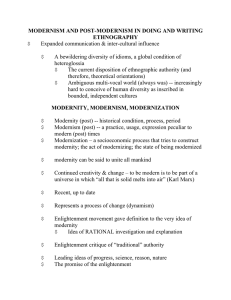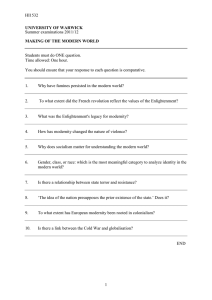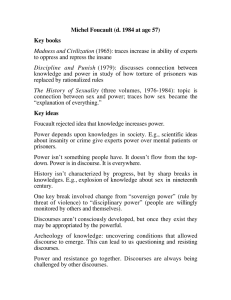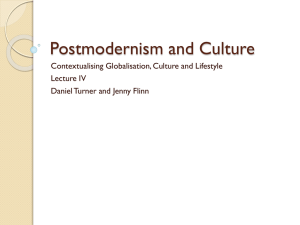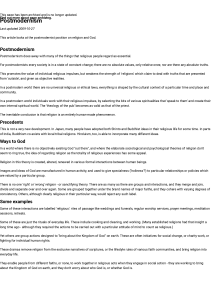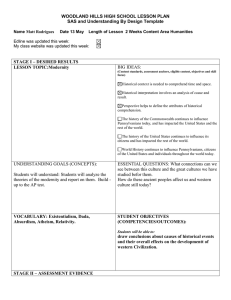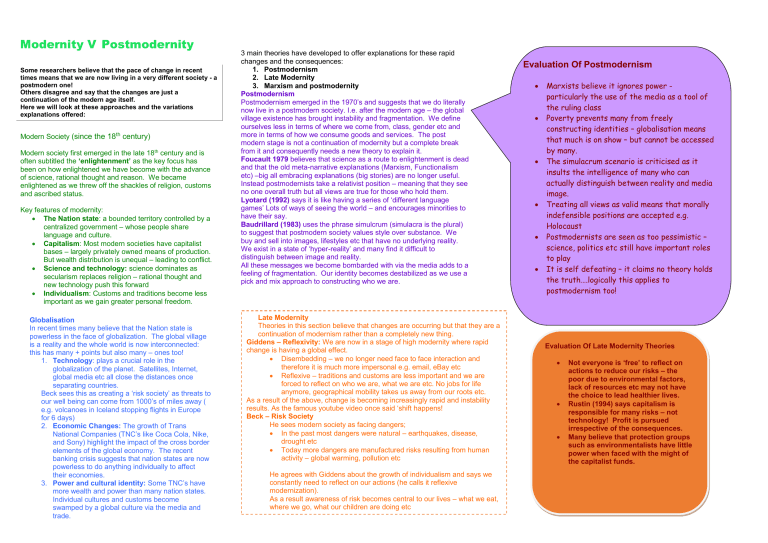
Modernity V Postmodernity Some researchers believe that the pace of change in recent times means that we are now living in a very different society - a postmodern one! Others disagree and say that the changes are just a continuation of the modern age itself. Here we will look at these approaches and the variations explanations offered: Modern Society (since the 18th century) Modern society first emerged in the late 18th century and is often subtitled the ‘enlightenment’ as the key focus has been on how enlightened we have become with the advance of science, rational thought and reason. We became enlightened as we threw off the shackles of religion, customs and ascribed status. Key features of modernity: The Nation state: a bounded territory controlled by a centralized government – whose people share language and culture. Capitalism: Most modern societies have capitalist bases – largely privately owned means of production. But wealth distribution is unequal – leading to conflict. Science and technology: science dominates as secularism replaces religion – rational thought and new technology push this forward Individualism: Customs and traditions become less important as we gain greater personal freedom. Globalisation In recent times many believe that the Nation state is powerless in the face of globalization. The global village is a reality and the whole world is now interconnected: this has many + points but also many – ones too! 1. Technology: plays a crucial role in the globalization of the planet. Satellites, Internet, global media etc all close the distances once separating countries. Beck sees this as creating a ‘risk society’ as threats to our well being can come from 1000’s of miles away ( e.g. volcanoes in Iceland stopping flights in Europe for 6 days) 2. Economic Changes: The growth of Trans National Companies (TNC’s like Coca Cola, Nike, and Sony) highlight the impact of the cross border elements of the global economy. The recent banking crisis suggests that nation states are now powerless to do anything individually to affect their economies. 3. Power and cultural identity: Some TNC’s have more wealth and power than many nation states. Individual cultures and customs become swamped by a global culture via the media and trade. 3 main theories have developed to offer explanations for these rapid changes and the consequences: 1. Postmodernism 2. Late Modernity 3. Marxism and postmodernity Postmodernism Postmodernism emerged in the 1970’s and suggests that we do literally now live in a postmodern society. I.e. after the modern age – the global village existence has brought instability and fragmentation. We define ourselves less in terms of where we come from, class, gender etc and more in terms of how we consume goods and services. The post modern stage is not a continuation of modernity but a complete break from it and consequently needs a new theory to explain it. Foucault 1979 believes that science as a route to enlightenment is dead and that the old meta-narrative explanations (Marxism, Functionalism etc) –big all embracing explanations (big stories) are no longer useful. Instead postmodernists take a relativist position – meaning that they see no one overall truth but all views are true for those who hold them. Lyotard (1992) says it is like having a series of ‘different language games’ Lots of ways of seeing the world – and encourages minorities to have their say. Baudrillard (1983) uses the phrase simulcrum (simulacra is the plural) to suggest that postmodern society values style over substance. We buy and sell into images, lifestyles etc that have no underlying reality. We exist in a state of ‘hyper-reality’ and many find it difficult to distinguish between image and reality. All these messages we become bombarded with via the media adds to a feeling of fragmentation. Our identity becomes destabilized as we use a pick and mix approach to constructing who we are. Late Modernity Theories in this section believe that changes are occurring but that they are a continuation of modernism rather than a completely new thing. Giddens – Reflexivity: We are now in a stage of high modernity where rapid change is having a global effect. Disembedding – we no longer need face to face interaction and therefore it is much more impersonal e.g. email, eBay etc Reflexive – traditions and customs are less important and we are forced to reflect on who we are, what we are etc. No jobs for life anymore, geographical mobility takes us away from our roots etc. As a result of the above, change is becoming increasingly rapid and instability results. As the famous youtube video once said ‘shift happens! Beck – Risk Society He sees modern society as facing dangers; In the past most dangers were natural – earthquakes, disease, drought etc Today more dangers are manufactured risks resulting from human activity – global warming, pollution etc He agrees with Giddens about the growth of individualism and says we constantly need to reflect on our actions (he calls it reflexive modernization). As a result awareness of risk becomes central to our lives – what we eat, where we go, what our children are doing etc Evaluation Of Postmodernism Marxists believe it ignores power particularly the use of the media as a tool of the ruling class Poverty prevents many from freely constructing identities – globalisation means that much is on show – but cannot be accessed by many. The simulacrum scenario is criticised as it insults the intelligence of many who can actually distinguish between reality and media image. Treating all views as valid means that morally indefensible positions are accepted e.g. Holocaust Postmodernists are seen as too pessimistic – science, politics etc still have important roles to play It is self defeating – it claims no theory holds the truth….logically this applies to postmodernism too! Evaluation Of Late Modernity Theories Not everyone is ‘free’ to reflect on actions to reduce our risks – the poor due to environmental factors, lack of resources etc may not have the choice to lead healthier lives. Rustin (1994) says capitalism is responsible for many risks – not technology! Profit is pursued irrespective of the consequences. Many believe that protection groups such as environmentalists have little power when faced with the might of the capitalist funds.
